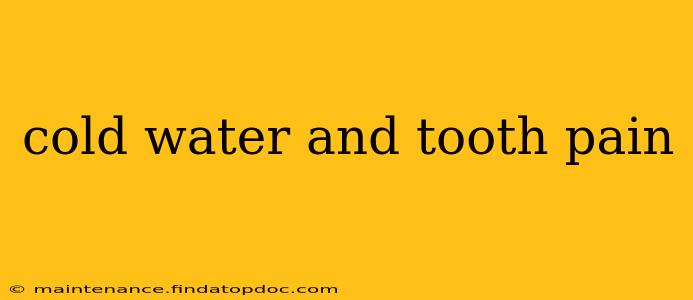Experiencing sharp, shooting pain in your teeth when you drink cold water? You're not alone. This common symptom can stem from several underlying dental issues, and understanding the cause is crucial for effective treatment. This article will explore the link between cold water and tooth pain, examining the potential causes and offering guidance on finding relief and preventing future discomfort.
What Causes Tooth Pain from Cold Water?
The sensitivity to cold often points to exposed dentin, the layer beneath your tooth enamel. Enamel protects the dentin, and when it's worn away or damaged, the dentin's microscopic tubules become exposed. These tubules contain nerve fibers, which react to temperature changes, leading to pain. This sensitivity can range from mild discomfort to intense, sharp pain.
Why Does Cold Water Specifically Trigger Tooth Pain?
Cold temperatures constrict blood vessels within the dentin. This constriction can, paradoxically, increase the nerve activity in the exposed tubules, causing the sharp pain. The sudden change in temperature is the key trigger.
What Dental Problems Can Cause Tooth Sensitivity to Cold?
Several dental issues can lead to increased sensitivity to cold water:
1. Tooth Decay (Cavities):
Cavities create holes in the tooth enamel, exposing the underlying dentin and making teeth highly sensitive to temperature changes. The pain often intensifies when consuming sweet, hot, or cold foods and drinks.
2. Gum Recession:
As gums recede, they expose the root surfaces of the teeth. The roots lack the protective enamel of the crown, making them significantly more vulnerable to sensitivity. This often leads to pain from cold, hot, or sweet substances.
3. Worn Enamel:
Enamel erosion from acidic foods and drinks, aggressive brushing, teeth grinding (bruxism), or even certain medical conditions can expose the dentin, making teeth sensitive to cold.
4. Cracked or Chipped Tooth:
A crack or chip in the tooth can expose the dentin and pulp (the inner part of the tooth containing nerves and blood vessels), causing immediate and intense pain from cold stimuli.
5. Recent Dental Work:
Sensitivity to cold is a common side effect after dental procedures like fillings, crowns, or root canals. This sensitivity usually subsides within a few weeks.
6. Periodontal Disease (Gum Disease):
Advanced gum disease can lead to the exposure of the tooth roots, mirroring the sensitivity issues seen in gum recession.
How Can I Treat Tooth Sensitivity to Cold?
The treatment depends on the underlying cause of the sensitivity. Here are some common approaches:
1. Desensitizing Toothpaste:
Many toothpastes contain ingredients like potassium nitrate or strontium chloride that help block the nerve signals in the dentin tubules, reducing sensitivity to cold.
2. Fluoride Treatments:
Fluoride strengthens enamel and can help repair minor damage, making teeth less susceptible to sensitivity. Your dentist can recommend professional fluoride treatments.
3. Dental Fillings or Crowns:
If tooth decay or a crack is the cause, a dental filling or crown might be necessary to protect the exposed dentin.
4. Gum Grafting:
For gum recession, gum grafting can help restore the gum line, covering exposed root surfaces.
5. Root Canal:
If the nerve of the tooth is irreparably damaged, a root canal may be required to remove the infected or damaged pulp and prevent further pain.
When Should I See a Dentist for Cold Sensitivity?
While mild sensitivity might be manageable with over-the-counter remedies, you should see a dentist if:
- The sensitivity is severe or persistent.
- The pain is accompanied by swelling, throbbing, or other symptoms.
- The sensitivity worsens over time.
- You notice a significant change in your tooth's appearance.
By understanding the potential causes of tooth pain from cold water and seeking timely professional care, you can address the underlying issue, relieve your discomfort, and maintain a healthy smile. Remember, prevention is key, so maintain good oral hygiene practices and schedule regular dental checkups.
